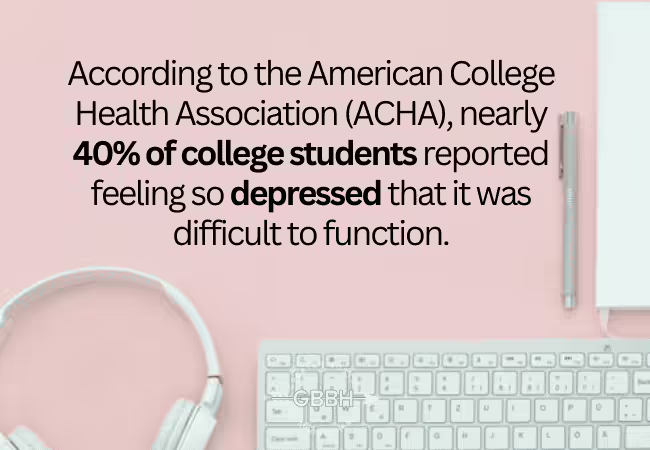Entering college is a thrilling milestone toward independence and development. But wait, not everything is a bed of roses. Mental health is affected in the first semester due to the academic pressure and social interactions that come with new roles. This is because it is a new phase that is quite difficult to adapt. Therefore, this blog post is here to help you know the impact of the first semester of college on mental health and how to support students at this time!
How the First Semester of College Impacts Mental Health
Several factors can impact the students’ mental health during the first semester. To know what these are, follow the information mentioned below:
Academics Pressure
Attending college can be quite difficult as it requires students to learn how to manage their time and work without supervision. Due to the increase in challenging assignments, projects, and exams, students’ stress and anxiety may rise further, especially for students who are more worried about their performance.
The Social Transition
When it comes to transitioning to college, comes with difficulty for numerous students, particularly due to the attempt to fit in. Many shy students are prone to social anxiety and feel that social networking increases their isolation and inferiority complex.
Homesickness and Identity
However, distance from family, especially while one is away from home for the first time, can lead to homesickness. It ultimately results in depression or even anxiety. Apart from this, students might feel overwhelmed as they seek to understand and discover their identities and their purpose of existence.
Sleep and Nutrition
For students, living in a college can impact their physical and mental health. Including no sleep patterns and unhealthy eating habits may cause emotional imbalance, anxiety, or even stress. With excess binge-watching and eating junk food, these conditions can worsen.
Stress and Anxiety in the First Semester
The first semester of college can be overwhelming for many students. According to the American College Health Association, approximately 60% of college students report feeling overwhelmed by all they have to do, and 40% experience anxiety. The pressure to perform academically, meet new social expectations, and adjust to a completely new lifestyle can cause stress, anxiety, and even depression.
Students often find themselves juggling difficult coursework, extracurricular activities, part-time jobs, and a new social life, all while trying to maintain a sense of balance. The stress of managing these responsibilities can take a toll on mental health. Academic pressures and fear of failure are common sources of stress, leading to anxiety, poor sleep, and burnout.
Loneliness and Isolation
Leaving home and starting college can also lead to feelings of loneliness and isolation. Many students find it difficult to make new friends or adapt to living in a dorm room with strangers. Homesickness is another challenge that many students face, especially if they’re far from home for the first time. These feelings of isolation can exacerbate underlying mental health issues, such as depression or social anxiety.
The pressure to fit in and form new social connections can be overwhelming. This sense of isolation can increase the risk of developing mental health challenges if not addressed. It is important for students to be proactive in seeking support and building a healthy social network. Cognitive-Behavioral Therapy in Boston is one option that can help students better manage feelings of loneliness and isolation.
Signs of Metal Health Issues for Students
If students become aware of early indications of worsening mental health. Then it can help them and those around them take appropriate action. Some frequent indicators are:
- Feeling sad or angry most of the time.
- Unwillingness to engage in any kind of entertainment.
- Changing in sleep routine and food intake.
- Problems with focusing.
- Feeling extremely depressed and worthless.
Increased Substance Use and Risky Behaviors
The first semester of college is often associated with increased substance use and experimentation. College students may be exposed to environments where drinking and partying are normalized, which can lead to increased alcohol or drug consumption. While some students may engage in these behaviors to relieve stress or feel a sense of belonging, substance use can exacerbate underlying mental health issues, such as depression, anxiety, or anger.
Seeking support through Anger Management in Recovery or DBT Therapy in Boston can help students address the emotional factors driving their substance use and build healthier coping mechanisms. Therapy offers tools for managing stress, improving emotional regulation, and developing healthier habits.
Academic Pressure and Perfectionism
The academic pressure that comes with college is another contributing factor to mental health struggles during the first semester. Many students are used to performing well in high school and feel a significant amount of pressure to continue excelling in college. For some students, this pressure can develop into perfectionism, where they feel like they must always succeed or risk failure. This can lead to feelings of inadequacy, anxiety, and burnout.
Students who struggle with perfectionism or fear of failure may benefit from therapies like Dialectical Behavior Therapy (DBT) or Cognitive-Behavioral Therapy. These therapies help students reframe their thinking patterns, manage stress, and develop more realistic expectations for themselves.
Strategies for Overcoming Mental Health Challenges!
If you want to get rid of mental health issues, here are some amazing strategies mentioned below:
- Encouraging open talk about mental health helps build a more understanding and less prejudiced community.
- Positive interactions with students and finding help from friends, family, or campus can help in creating a secure setting.
- Stressing the need for time management and self-care enables learners to maintain a healthy personal and academic life.
- Providing mental health resources that are easy to access and free from bias on campus inspires students to turn for help when required.
Seeking Support: How Therapy Can Help
Mental health challenges like anxiety, depression, and stress during the first semester of college are common, but they don’t have to be faced alone. Seeking support from a Boston Behavioral Health center can make a significant difference in a student’s ability to manage their mental health during this time of transition.
CBT Therapy in Boston is particularly effective for students struggling with negative thinking patterns, anxiety, and depression. CBT helps individuals identify and challenge unhelpful thought patterns and replace them with healthier, more balanced ways of thinking.
For students dealing with intense emotions, DBT Therapy in Boston can help regulate emotions, manage interpersonal relationships, and reduce stress. DBT is a particularly useful therapy for students who struggle with emotional regulation or feel overwhelmed by their emotions during high-stress periods like the first semester of college.
Building Resilience: Practical Tips for Coping with Stress
- Develop Healthy Habits: Regular exercise, adequate sleep, and balanced nutrition can help manage stress and improve overall mental well-being. Creating a structured daily routine can help students feel more in control.
- Reach Out for Support: Joining student groups, seeking out friends, and talking to professors or counselors can provide emotional support and reduce feelings of isolation. Therapy can also help students feel more grounded during this time.
- Learn to Manage Stress: Incorporating stress-management techniques such as mindfulness, deep breathing exercises, and time management can help reduce the overwhelming feelings associated with a busy college schedule.
- Set Realistic Expectations: It’s important to remember that perfection is not the goal. Setting realistic goals and practicing self-compassion are key to maintaining mental health.
Need Professional Help? Call GBBH!
Greater Boston Behavioral Health is the best Mental Health Treatment Center in Massachusetts to get back on life. We have an experienced team of doctors who know how to deal with students and set them on the right track. We offer Dialectical behavioral therapy that helps to address substance abuse and co-occurring mental health issues. Join us now and feel the real change in you.
Conclusion
The first semester of college can be a challenging time for mental health, but it is also a time for growth, self-discovery, and resilience. The pressure of academics, social challenges, and adjusting to a new environment can lead to stress, anxiety, and depression, but support is available. Mental health programs in Boston, such as DBT Therapy and CBT Therapy, can offer students the tools and coping strategies they need to manage the challenges of college life. Reaching out for support when needed is crucial to maintaining mental health and ensuring a successful college experience. If you’re struggling with the transition to college, don’t hesitate to reach out to a Mental Health Treatment Center in Boston for help and support. Call us at (888)278-0716 today to learn more about our services and how we can help you on your journey to recovery!
FAQs on Impact of the First Semester of College on Mental Health
Why is the first semester of college so stressful?
The first semester of college is often stressful due to the combination of academic pressure, social adjustment, and increased independence. Many students face challenges such as managing their time, maintaining relationships, and coping with feelings of isolation or homesickness.
How can therapy help with the mental health challenges of college?
Therapy can help students manage stress, anxiety, and depression by providing them with tools to regulate emotions, challenge negative thought patterns, and build healthier coping strategies. Therapy types such as CBT (Cognitive-Behavioral Therapy) and DBT (Dialectical Behavior Therapy) are especially beneficial for students struggling with these challenges.
When should a college student seek professional help for mental health?
Students should seek professional help when they experience persistent feelings of sadness, anxiety, or stress that interfere with their daily activities, academic performance, or relationships. Therapy can be beneficial for those feeling overwhelmed or struggling to adjust to college life.
How does DBT Therapy benefit students struggling with emotional regulation?
DBT Therapy helps students develop skills to manage intense emotions, improve interpersonal relationships, and tolerate distress. This is especially helpful for students experiencing heightened emotional responses during stressful times, such as the first semester of college.
What mental health services are available for college students in Boston?
Boston offers a wide range of mental health services, including individual therapy, group therapy, and specialized treatments like CBT and DBT. Students can find support through Mental Health Programs in Boston, as well as university counseling centers and local Mental Health Treatment Centers in Boston.


